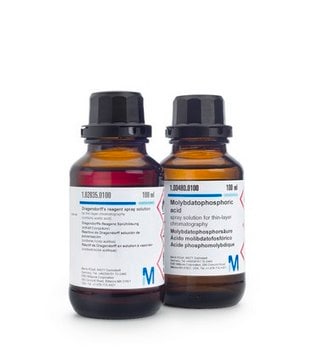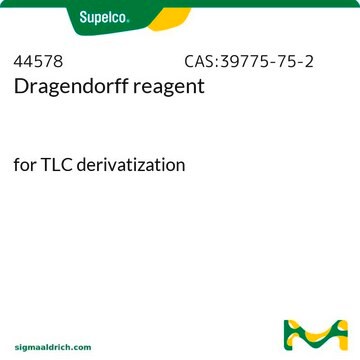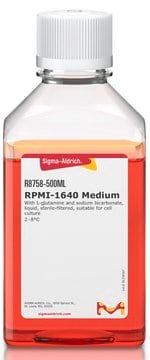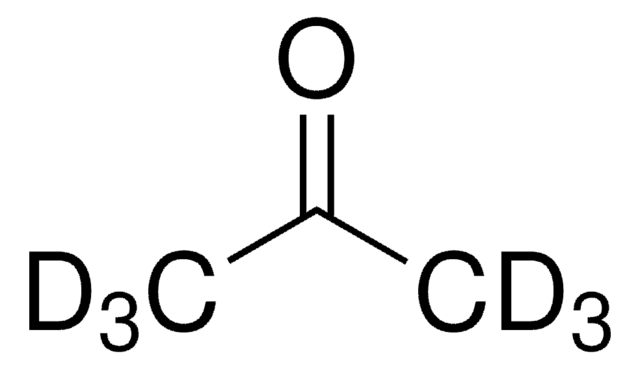추천 제품
Quality Level
양식
liquid
기술
thin layer chromatography (TLC): suitable
불순물
1-butanol
acetic acid
density
0.823 g/mL at 20 °C
일반 설명
Ninhydrin reagent is mostly used for the detection of amino acids. It basically gives a characteristic purple color on reaction with a-amino acids and other amino compounds, provided the pH of the reaction is 5.0 or higher. At an acid pH of 0.3, the reaction of ninhydrin with ornithinine and proline results in a red color product. Ninhydrin reagent can stay stable at room temperature in the absence of nitrogen atmosphere for upto 1 month in the ethylene glycol-sodium acetate solvent system.
애플리케이션
1 g ninhydrin dissolved in 475 mL 1-butanol and 25 mL acetic acid
Ninhydrin reagent may be used for the quantitative determination of total protein content in tissue hydrolysates.
신호어
Danger
유해 및 위험 성명서
Hazard Classifications
Acute Tox. 4 Oral - Eye Dam. 1 - Flam. Liq. 3 - Skin Irrit. 2 - STOT SE 3
표적 기관
Central nervous system, Respiratory system
Storage Class Code
3 - Flammable liquids
WGK
WGK 2
Flash Point (°F)
93.2 °F - closed cup
Flash Point (°C)
34 °C - closed cup
개인 보호 장비
Faceshields, Gloves, Goggles, type ABEK (EN14387) respirator filter
가장 최신 버전 중 하나를 선택하세요:
이미 열람한 고객
B Starcher
Analytical biochemistry, 292(1), 125-129 (2001-04-26)
Quantitation of small tissue samples for total protein content is essential for many biochemical analyses. In this study a ninhydrin method for measuring the total protein content of tissue hydrolysates is presented. The ninhydrin reagent is stable at room temperature
M K Gaitonde
The Biochemical journal, 104(2), 627-633 (1967-08-01)
1. An acid ninhydrin reagent was found to react specifically in forming a pink product (E(max.) 560mmu) with cysteine. 2. The method was highly sensitive for the determination of cysteine (in 28.0x10(3)). Homocysteine, glutathione, proline, ornithine and other naturally occurring
Sylvia Kristyanto et al.
Journal of microbiology (Seoul, Korea), 56(5), 317-323 (2018-05-04)
A novel, aerobic, Gram-stain-negative, non-motile, non-spore forming, rod-shaped bacterium, designated strain Dol 15-39T, was isolated from a seawater sample near Geoje Island in the South Sea, Republic of Korea. The strain was found to be oxidase-negative and catalase-positive. The isolate
Thin Layer Chromatography in Phytochemistry.
Hajnos WM
Science, 312-312 (2008)
자사의 과학자팀은 생명 과학, 재료 과학, 화학 합성, 크로마토그래피, 분석 및 기타 많은 영역을 포함한 모든 과학 분야에 경험이 있습니다..
고객지원팀으로 연락바랍니다.
